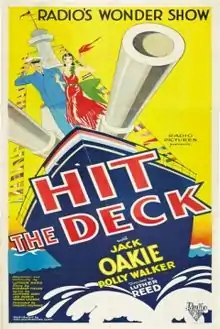Hit the Deck (1930 film)
Hit the Deck is a 1930 American pre-Code musical film directed by Luther Reed, which starred Jack Oakie and Polly Walker, and featured Technicolor sequences.[2] It was based on the 1927 musical Hit the Deck, which was itself based on the 1922 play Shore Leave by Hubert Osborne. It was one of the most expensive productions of RKO Radio Pictures up to that time, and one of the most expensive productions of 1930. This version faithfully reproduced the stage version of the musical.
| Hit the Deck | |
|---|---|
 Film poster | |
| Directed by | Luther Reed Fred Fleck (assistant) |
| Produced by | William LeBaron |
| Written by | Hubert Osborne Herbert Fields Luther Reed |
| Starring | Jack Oakie Pollie Walker |
| Music by | Victor Baravalle (director) Vincent Youmans (music) |
| Cinematography | Robert Kurrle |
| Edited by | William Hamilton |
Production company | |
| Distributed by | RKO Radio Pictures |
Release date | |
Running time | 93 minutes[1][2] |
| Country | United States |
| Language | English |
| Budget | $542,000[3] |
| Box office | $1.1 million[3] |
Plot
Looloo (Walker) runs a diner which is frequented with U.S. Navy sailors on shore leave, including officers. Two officers, Admiral Smith (Henderson) and Lieutenant Allen (MacDonald) accompany a wealthy socialite, Mrs. Payne (Clayton), to the establishment.
Mrs. Payne is an heiress, and when she engages in conversation with Looloo, she expresses admiration for the necklace Looloo is wearing. She offers to purchase it for a substantial sum, but it is a family heirloom and Looloo refuses. Later, two sailors arrive at the diner, Bilge (Oakie) and Clarence (Ovey), looking for Lavinia, Clarence's sweetheart who has run away. Bilge, is smitten with Looloo, and begins to romance her. Opening up to her, he reveals his desire to become the captain of his own ship after he leaves the navy. Before things go too far, Bilge's shipmates drag him back to his ship, which is scheduled to set sail.
Based on her conversation with Bilge, Looloo decides to sell her necklace to Mrs. Payne, in order to get the funds necessary to buy a ship for Bilge. When Bilge's ship docks once again, the two lovers are re-united, and Bilge proposes to Looloo, who happily accepts. However, when she tells him about the money, and the plans she's made to help him buy his own ship, his pride makes him indignant and he storms off. However, he later returns and the two agree to marry.
Cast
- Jack Oakie as Bilge
- Polly Walker as Looloo
- Roger Gray as Mat
- Franker Wood as Bat
- Harry Sweet as Bunny
- Marguerita Padula as Lavinia
- June Clyde as Toddy
- Wallace MacDonald as Lieutenant Allen
- George Ovey as Clarence
- Ethel Clayton as Mrs. Payne
- Nate D. Slott as Dan (as Nate Slott)
- Andy Clark as Dinty
- Dell Henderson as Admiral Smith
- Charles Sullivan as Lieutenant Jim Smith
- Grady Sutton as sailor (uncredited)
Songs
- "Sometimes I'm Happy" - words by Irving Caesar, music by Vincent Youmans; performed by Jack Oakie and Polly Walker
- "Keepin' Myself for You" - words by Sidney Clare, music by Vincent Youmans; performed by Jack Oakie and Polly Walker
- "An Armful of You" - words by Leo Robin and Clifford Grey, music by Vincent Youmans; performed by Marguerita Padula and chorus
- "Hallelujah" - words by Leo Robin and Clifford Grey, music by Vincent Youmans; performed by Marguerita Padula and chorus
- "Harbor of My Heart" - words by Leo Robin and Clifford Grey, music by Vincent Youmans; performed by Jack Oakie and chorus
- "Join the Navy" - words by Leo Robin and Clifford Grey, music by Vincent Youmans; performed by Jack Oakie and chorus
- "Nothing Could Be Sweeter" - words by Leo Robin and Clifford Grey, music by Vincent Youmans; performed by Jack Oakie and Polly Walker
Reception
The film made a profit of $145,000.[3] Mordaunt Hall, The New York Times critic, gave the film a lackluster review, writing that it "is anything but an inspired entertainment. Except for one or two sequences, the mixing of the story and spectacle doesn't jell. The fun is labored and the romance is more painful than sympathetic."[2]
Other adaptations
The Broadway musical, Hit the Deck , on which this film is based was written by Herbert Fields, with music by Vincent Youmans, and lyrics by Leo Robin and Clifford Grey; it premiered in New York City on April 25, 1927. That musical was based on an earlier play, Shore Leave, written by Hubert Osborne, which premiered in New York City on August 8, 1922.[1] The play had been made into a silent film, also entitled Shore Leave, starring Richard Barthelmess and Dorothy Mackaill. Osborne's play would also be remade into another musical version, Follow the Fleet, in 1936, starring Fred Astaire and Ginger Rogers.[1]
Preservation status
The film is considered a lost film.[4] The last known copy was destroyed in an RKO fire in the 1950s.
See also
References
- "Hit the Deck: Detail View". American Film Institute. Retrieved April 16, 2014.
- Hall, Mordaunt (January 15, 1930). "The Screen". The New York Times. Retrieved August 18, 2008.
- Richard Jewel, 'RKO Film Grosses: 1931-1951', Historical Journal of Film Radio and Television, Vol 14 No 1, 1994 p56
- "Hit the Deck: Trivia". Turner Classic Movies. Archived from the original on June 5, 2014. Retrieved June 4, 2014.
External links
- Hit the Deck at IMDb